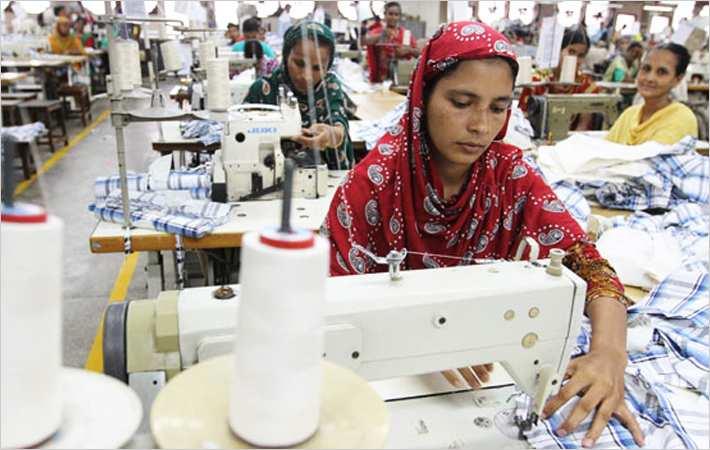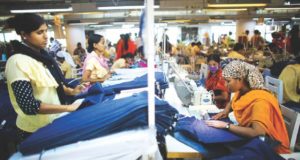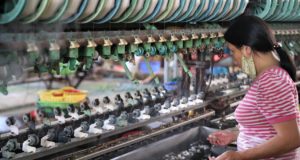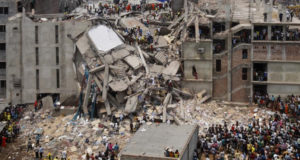Published in the Dhaka Tribune on July 7, 2017
Ibrahim Hossain Ovi
Bangladesh’s export earnings from the apparel industry, the lifeline of foreign currency earners, have seen only a 0.20% rise to $28.15 billion, which is the lowest on record in the last one and a half decades, in the just-concluded fiscal year.
However, Bangladesh’s overall export earnings stood at $34.83 billion in FY’17, which is 1.68% higher than the $34.25 billion a year ago.
Since the inception of RMG export, Bangladesh has registered negative growth only once in 2001-02 fiscal year, by 5.68%, to $4.58 billion.
Trade analysts and businessmen have blamed average price fall of products, ongoing structural reforms in the apparel industry, economic slowdown and sluggish demand in export destinations, devaluation of Euro and appreciation of BDT against US dollar, for the lackluster export growth.
According to provisional data of Export Promotion Bureau (EPB), Bangladesh’s export earnings from the RMG sector stood at $28.14 billion, posting 0.20% growth in the past fiscal year. The figure is 7.34% less than the target of $30.38 million.
In the last fiscal year, Bangladesh earned $28.09 billion from the clothing industry.
Of the total amount, Knitwear products earned $13.76 billion, which is 3% higher than the $13.35 billion in the same period a year ago. Woven products earned $14.39 billion, down by 2.35%, compared to $14.73 billion a year ago.
As per the provisional data, in FY’17, Bangladesh’s overall export earnings stood at $34.83 billion with 1.68% growth. The figure is over $2 billion less than that of the government target of $37 billion set for the previous fiscal. In June, export earnings saw a 15.27% fall to $3 billion, which was $3.59 billion in the same period last year.
“The meager growth is a reality in the Bangladesh RMG sector. It comes as no surprise as the apparel industry is going through many challenges, including remediation, devaluation of Euro and labour unrest,” Exporters Association president Abdus Salam Murshedy told the Dhaka Tribune.
RMG manufacturers are working hard to face the challenges by introducing production engineering, technological upgrade etc, but it is not enough, said Salam.
In continuation with the existing policy support, the government should offer special incentives, including 5% cash incentives on the value of Freight on Board (FoB) for at least next two years, the former BGMEA president said.
On the other hand, to bring about sound export growth, the government has to come up with long-term policy support, including tax holiday for 10 years, for new investors to attract investment.
“The average price fall of products and slow demand for products in the global market has led to sluggish growth in export earnings while our competitors are doing better in the global arena,” Prof Mustafizur Rahman, a distinguished fellow at the Centre for Policy Dialogue (CPD), told the Dhaka Tribune.
Bangladesh has to develop competitive edge by increasing workers’ productivity as there is pressure ahead over hike in workers wage, he said. The CPD fellow suggested that the country should focus on RMG product diversification, and to do that, the businessmen, as well as the government, need to come up with newer efforts.
“Our export earnings, including from the service sector, stood at over $35 billion in the just concluding fiscal. In the current fiscal year, Bangladesh will see a sharp rise in export as the clothing industry is very close to the end of the remediation process,” Commerce Minister Tofail Ahmed told the Dhaka Tribune.
“Export earnings, especially from clothing products, have witnessed meager growth due to price fall and devaluation of Euro and Pound,” Bijoy Bhattacharjee, vice-chairman of EPB, told the Dhaka Tribune.
Bangladesh has to focus on quality products and EPB in the current fiscal year will work on the issue, he said,adding that on the other hand, the government is working very hard to diversify products and market in line withits Seventh Five-Year Plan.
 CPD RMG Study Stitching a better future for Bangladesh
CPD RMG Study Stitching a better future for Bangladesh




